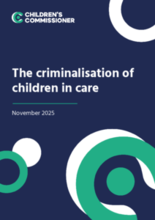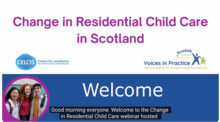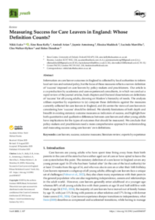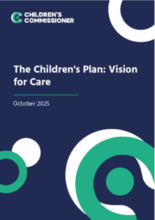Displaying 21 - 30 of 1185
This Guardian article tells the story of Craig, who became homeless at 13 after running away from a children’s home in Nottingham.
The Family Network Pilot (FNP) aims to help UK children stay safely within their extended families and prevent entry into care by providing Family Group Conferences and Family Network Support Packages. This report evaluates the pilot’s implementation, processes, and impacts across seven local authorities, using qualitative research and monitoring data analysis.
The Children’s Commissioner’s report “The Criminalisation of Children in Care” reveals a deeply concerning pattern: children in care in the UK are disproportionately drawn into the criminal justice system, often for low-level incidents that, in a family setting, would be handled without police involvement. To address this, the Commissioner calls for a strengthened, statutory protocol among police, local authorities, and youth services; better diversion pathways; a more child-friendly prosecution process; increased legal aid and training; more stable, high-quality care placements; and improved data sharing to monitor and prevent harmful police involvement.
CELCIS’ October 2025 webinar explored recent developments in residential child care across Scotland, featuring insights on nurture-based practice, shifts in inspection approaches aligned with The Promise, and staff development through reflective practice. Speakers highlighted how new care models, regulatory changes, and whole-system approaches are strengthening practice and improving outcomes for children and young people.
This article reports a 45% increase in the number of children in England waiting for adoption since 2022, while the number of approved adopters has fallen by around 42%.
This article from CELCIS explores the Scottish Government’s consultation on creating a universal definition of “care experience”, advocating for language and policy that reflect diverse cultural contexts—including those of people from the Global S
This article reviews how ‘success’ is defined for young adults, comparing academic and care-experienced perspectives with the narrow statutory outcome measures currently used for care leavers in England. It finds that existing measures are limited and advocates for a more comprehensive approach that centers care leavers’ own definitions of success.
This book analyzes 100 care cases to examine how jurisdiction and cross-border information sharing operate in child protection, drawing on the first empirical study of Brussels IIa and the 1996 Hague Convention in England. It highlights how children's welfare can be compromised in international care proceedings while offering recommendations to improve the interpretation and application of private international law to better safeguard their best interests.
This report assesses Scotland’s efforts to fulfil The Promise—a national commitment made in 2020 to overhaul the country’s care system so children and young people “grow up loved, safe and respected.” It identifies significant persistent challenges in three key areas: governance and accountability, data and measurement, and resources and investment.
This report from the UK Children’s Commissioner, Dame Rachel de Souza, reviews progress and challenges in children’s social care since she began her term in 2021. It highlights persistent failures to uphold children’s rights and presents a vision for transformative reform centered on those rights.







